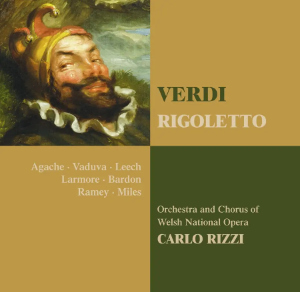
Giuseppe Verdi (1813-1901)
Rigoletto (1851)
Il Duca di Mantova: Richard Leech (tenor)
Rigoletto: Alexandru Agache (baritone)
Gilda: Leontina Vaduva (soprano)
Maddalena: Jennifer Larmore (mezzo-soprano) Giovanna: Patricia Bardon (mezzo-soprano) Sparafucile: Samuel Ramey
Il Conte di Monterone: Alastair Miles (bass)
Orchestra & Chorus of Welsh National Opera/Carlo Rizzi
rec. February 1993, Brangwyn Hall, Swansea, UK
Originally released on Teldec 4509-90851-2
Warner Classics 2564 688013 [121]
I did not include this recording in my survey – and I should have. My colleague Göran Forsling favourably reviewed highlights nearly twenty years ago, and it is not too early or late to revisit it, as it is still available as a download on the Warner and Teldec labels, although here I auditioned the original CD set.
Imprinted as I am with the Bonynge and Serafin versions, I have to make the mental effort to wipe my auditory hard disc clean before I assess any other recording – which of course I can’t – but I do try to judge it fairly while still acknowledging the supremacy of those two classic accounts.
The first soloists we hear are the two tenors Richard Leech and Barry Banks. This must surely be one of the former’s best recordings, and Banks is of course still going strong having had a brilliant career. From a perspective of thirty years on, the array of premium-class voices here is really impressive: Alastair Miles could just as easily have been singing Sparafucile as Monterone but we have on hand another great bass at the peak of career in Sam Ramey, oily and sonorous as the assassin. Similarly, Patricia Bardon in the minor role of Giovanna, was to go on to greater things. Jennifer Larmore’s smoky, gutsy mezzo as Maddalena is a real bonus. Alexandru Agache‘s large, dark, mellow voice is ideally suited to Verdian lyric baritone roles; he has the top notes and handles text expressively, if not without the range of Gobbi, and the slight break in his voice when he switches up is emotionally effective, too. He could surely make more drama of key moments such as “Sono bendato! Ah! La maledizione!” but makes up for that failing later in “Cortigiani!”. Leontina Vaduva has a limpid, flexible soprano very reminiscent of her more celebrated compatriot Ileana Cotrubas; she has strong, pure top notes – including a cheeky top D-sharp at the end of “Si, vendetta” – impeccable intonation and she characterises convincingly. “Caro nome” is beautifully, touchingly vocalised, with a fine trill to end. Both she and Leech take a stirring top C-sharp to conclude their Act I duet; indeed, both that and the one with her father go swimmingly. Leech hasn’t Pavarotti’s “ping” or Di Stefano’s bravura, but he sings “Parmi veder le lagrime” with such feeling that you temporarily forget what a swine the Duke is. This being a complete edition, he is of course given the oft-omitted “Possente amor” which he sings with great ardour; his best moment, however, comes in the famous Act III quartet, “Bella figlia dell’amore”, where he phrase seductively and passionately, his high notes ringing out confidently. Try it on YouTube to hear what I mean.
For all the beauties of the first two acts, for me a recording of Rigoletto stands or falls by how dramatic the final act is. The act opens slowly, with brooding menace and Rizzi maintains the tension throughout the storm. I have already commended Leech’s sterling contribution to the quartet; in fact, all four singers are in top form there, but the singing throughout is splendid and the tragedy hits home.
I am impressed by the vigour and clarity of the chorus. I have read criticism elsewhere that Rizzi’s direction is sluggish but a quick comparison with timings of other complete sets confirms that this is not the case. I find his conducting to be energised and driven – but he also knows when to relax.
The sound is exemplary. The original Teldec box set came with a thick booklet containing a full Italian libretto with English, French and German translations; sadly, the Warner download doesn’t even come with a booklet of any kind.
I again regret not recommending this in my survey. It is not an absolute top choice, by any means, but so much about it is highly enjoyable.
Ralph Moore
Buying this recording via a link below generates revenue for MWI, which helps the site remain free


Other cast
Marullo: Peter Sidhom (baritone)
Borsa: Barry Banks (tenor)
Il Conte di Ceprano: Geoffrey Moses (bass)
Usciere: Fabrizio Visentin (tenor)
Paggio: Paula Bradbury (mezzo-soprano)

















